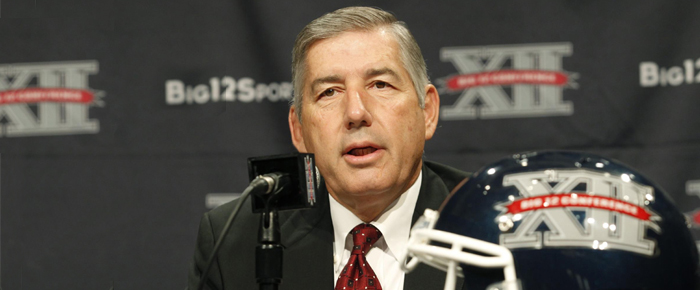
By Flint Wheeler
Big 12 commissioner Bob Bowlsby took to the podium Monday morning and wasn’t shy about voicing his opinion on the current college athletics model, specifically his displeasure with the ineffectiveness of the NCAA’s enforcement standards.
In his state of the conference address, Bowlsby didn’t speak glowingly about the future of the NCAA and college sports in general. Speaking at the beginning of Big 12 Media Days, Bowlsby said “If you like what you see in college athletics right now, you’re gonna be disappointed. Change is coming.”
The impact of lawsuits against the NCAA, including the Ed O’Bannon case, will drastically change the way college sports is structured. “I think all of that in the end will cause programs to be eliminated,” Bowlsby said, specifically saying men’s Olympic sports would be the target of cuts.
Bowlsby is beginning his third year as the conference’s commissioner. “I expect to be in court most of the rest of my career,” Bowlsby said. “That’s the whole nature of it. “I don’t think that’s what I signed up for.”
Bowlsby also had plenty to say about the current enforcement of NCAA rules. “It’s not an understatement to say that cheating pays presently,” Bowlsby said. Cheating is not rampant but the lack of enforcement and the power to impose significant penalties for not cooperating with investigations make the consequences of cheating negligible. “If you want to cheat, you can do it and you can get away with it and there are benefits to doing it,” Bowlsby said.
Bowlsby further warned that the NCAA will soon face financial struggles, saying expenses were rising at nearly twice the rate of revenue. The notion that college athletes could be considered employees was absurd, Bowlsby said. “Student-athletes are not employees. They shouldn’t ever be employees,” Bowlsby said. “It’s a total square peg in a round hole.”
Not everything was gloom and doom, though. Bowlsby said the league was in good position with the start of the four-team playoff, touting the league’s “One True Champion” motto. “The fact that we play everyone in the league is a nuance that’s not going to be overlooked by the committee,” Bowlsby said.
The league hasn’t won a national title since Texas in 2005.“I think it’s about time we did,” Bowlsby said.
The Pros of Paying College Athletes
In this age where social media is the king, making a profit out of sports is even a more ludicrous pursuit. Schools are actually making more money than ever from the revenues of televised college sports, especially the most popular men’s football and basketball.
However, the athletes involved in these games – the reason why sporting shows are such a hit in the first place – are not getting more than their scholarship grants; it is not even enough to cover for all their expenses; tuition, food, board, travel, books, and others. They have no other means to compensate for this need since sport practices take up all of their time after their academic responsibilities. Paying college students, a little extra, would actually go a long way, especially for the ones belonging to a family with low income.
If this point would be considered it might help to finally stop the abuses happening behind the scenes; abuses such as interested parties (i.e. recruiters) offering the athletes special “privileges” for favors as to how they wanted games to turn out. Shady business, yes, but it happens.
The Cons of Paying College Athletes
The main reason why paying college athletes still isn’t legalized is because of the strong stand of the spirit of amateurism against the idea. Most traditionalists would also argue that college sports exist not so the athletes could gain profit, but to foster the true meaning of sportsmanship between colleges. Involving money in the equation for the players’ participation would debase the essence of amateurism. Another big problem with the idea is its mere “unfairness” to less popular sports that acquire little to no revenue, and of course to the colleges with lesser funds. Who would be responsible for paying the students in this case? And what system will be used; do athletes with better performance get more pay than other members of the team?
Bowlsby’s comments are dead on, just not what one would expect to hear from someone in his position. In the wake of the NCAA botching the Miami case and running around in circles in Chapel Hill, not to mention the O’Bannon case and the current outcry for pay for players, the NCAA has an uphill battle on their hands and rightly so.










































